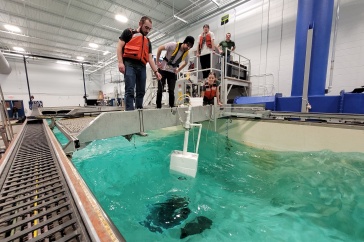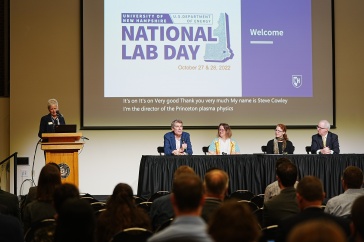
Jacey Chavez '19 served as the lead architect of the UNH engineering team that was recently selected as a finalist in the prestigious U.S. Department of Energy Solar Decathlon® 2021 Design Challenge.
A team of UNH engineering students was recently selected as a finalist in the prestigious U.S. Department of Energy Solar Decathlon® 2021 Design Challenge. The competition challenges student teams to design highly efficient and innovative buildings powered by renewable energy and aims to equip the next generation of the building workforce with the skills and passion to create future-ready buildings.
The UNH students, part of a senior design class, were selected in the elementary school building division based on their proposed project’s ability to improve the built environment using criteria outlined in a 70-page document. The team will make their final presentation to industry leaders at a virtual solar event that will take place April 15-19.
“This is going to shine a light on UNH and its students as quite an accomplishment,” says Felix “Skip” DeVito, the team’s project advisor and UNH adjunct faculty member. “The fields of sustainability and alternative energy are of much interest across the nation.”
The team comprises students in mechanical, environmental and civil engineering, including Hannah Gagne, Jacey Chavez, Tyler Heymans, John Plifka, Luke Zuchowski, Meredith Madden, Michael Pasciuto, Nicole Ramaker, Jonathan Stahl and Nicholas Thum. It was the first time UNH has competed in the challenge.
Gagne, the project lead, says from the start it was a goal to be named a finalist. She credited the diversity of experiences and knowledge as well as good teamwork for the group’s success.
“We’ve really been able to see how all the different engineering disciplines come together to create a final piece,” she says. “It’s been such a wonderful learning experience for everyone involved.”
  |
| A design of the 72,000 square foot, solar energy-powered net zero building. |
Since being named a finalist, the group has worked to perfect its design for the final presentation, making adjustments that include scaling down the building to better fit the target size of the school. The final design, spearheaded by Chavez, is for a two-story, 72,000 square foot, solar energy-powered net zero building, which means the amount of energy it would use on an annual basis is roughly equal to the amount of renewable energy created on the site. The school also has an electric powered bus fleet. Through the design process, the group overcame software hurdles and the challenges inherent to being the first UNH group to compete in the event.
Gagne says the experience highlighted all the right things about sustainability, new technology, resilience, energy performance, engineering ethics and more. “The competition really tests us as students to see if we have the integrity of what it takes in the professional realm,” she says. “Our team has worked hard both semesters and our final product will showcase this. “
DeVito’s goal for entering a UNH team into the competition was to give students a unique opportunity to take theoretical systems and put them into practice and design in the real world. After months of planning, designing and now being recognized for competing, DeVito sees the initiative as a success and hopes to see UNH continue to compete in the future.
“Most of the students are interested in sustainability and/or solar energy and want careers in these industries going forward so this was a great educational experience, networking opportunity and confirms their ability to work as a professional team,” says DeVito. “This will be something that they will always remember and treasure.”



















































